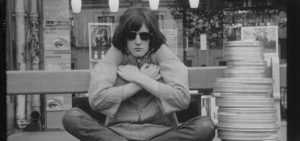Culture
Final collaboration between the late Lee Breuer and his son Mojo Lorwin finds new life at 2025 Athens International Film and Video Festival
By: Emily Votaw
Posted on:
ATHENS, Ohio – Lee Breuer made art for 83 very busy years.
Among his accomplishments was co-founding the groundbreaking experimental theater collective Mabou Mines, a group known for its radical reimaginings of classic texts and multimedia innovations. Not to mention that Breuer’s productions—whether transforming Henrik Ibsen’s A Doll’s House with a radical shift in scale or reimagining Sophocles’ Oedipus at Colonus as a gospel church service featuring the Blind Boys of Alabama and Morgan Freeman—were always boundary-pushing, visually striking, and reliably unconventional.
But, as anyone who has ever spent any amount of time making anything knows, not every project you start gets finished—and even fewer wrap up how you imagine they will.
Although Breuer had a far better track record of completing the creative projects he started than most artists, by the time he reached the end of his life, one creative endeavor in particular remained unfinished: a film project he had begun in France in the late 1960s with future Mabou Mines members.

That film project would remain scriptless, soundless, and completely untouched after principal photography wrapped in 1968—until late in Breuer’s life, when his son, Mojo Lorwin, began working on it. Throughout the three years following his father’s death in 2021, Lorwin transformed the unfinished work into a completed film, using his artistic intuition and fragments of his late father’s guidance.
The result is Moi-Même, one of the 2025 Athens International Film and Video Festival selections, which will screen at the Athena Cinema (20 South Court Street) on Friday, April 11 at 7:15 p.m.
Weighing in at just over an hour, Moi-Même is short, sweet, and—as often the case with art from the ’60s— more contemporary-feeling and comedic than you might expect. It tells the story of a fictional boy struggling to make a fictional film, all set against Paris’s real chaos and upheaval in 1968-69.
Lorwin says working on the project put him in “constant communication” with his father, even after his death.
“It was sort of an excuse to dig into his old notebooks (…) to sort of get in his headspace,” Lorwin says. “I think it kept me close to him after he died in a nice way.”
Though many would find the lack of concrete direction in assembling his late father’s film daunting, Lorwin didn’t—in fact, it seemed like he was the right man for the job from the start. As a film professor at SUNY Westchester Community College, Lorwin was already familiar with the kinds of films being made when his father and his friends shot all that footage.
“So I feel like I had sort of a head start aesthetically,” he says, noting that working without a script or sound left space to shape the film, blending writing and editing into a seamless, surprisingly linear process. “He left me this amazing footage, but because he didn’t have a script or sound, he also left me all this space to do my own thing with it.”
Moreover, his deep knowledge of Breuer’s approach to work gave him crucial insight into his father’s artistic instincts at the time, guiding his approach to finishing the film.
One aspect of his father’s approach to art-making was a commitment to working with family, both literal and chosen. In finishing Moi-Même, Lorwin embraced that same spirit, turning the project into a family affair of his own.
Lorwin enlisted his brother Alex (Tiappa) Klimovitsky to play acoustic guitar on two songs in the film, and his sister, Clove Galilee, to voice one of the actors. David Neumann—who voiced two characters—was the son of one of those characters and the godson of the other. Lorwin’s niece and a granddaughter of Breuer and one of the original actresses, Ruma, provides a little girl’s voice.
Even the film’s Foley work had deep family ties. Jay Peck, a Foley artist who had performed live sound effects for Breuer’s productions since Lorwin was a child, contributed both expressionistic, theater-style Foley and more realistic film Foley. Now an industry veteran with credits including work for the Coen Brothers and Ari Aster, he helped bridge the gap between Breuer’s avant-garde theatrical roots and Lorwin’s vision for the film.
For Lorwin, Moi-Même is about the broader countercultural and avant-garde artistic movements of the ’60s and the struggles, failures, and moments of clarity that come with making art itself. Watching the people recorded all those decades ago on the film his father left behind, Lorwin says he couldn’t help but reflect that “they’re in the middle of what many of them thought was a revolution.”
“There’s all this hope, and there’s all this idealism and all this rebellious energy (…), and a lot of that hasn’t panned out the way people thought it would at the time if you look at our present situation.”
Even so, Lorwin says there’s still much to learn by reflecting on this point in history.
“(W)hat do we mourn about that idealism? What seems naive or even ridiculous to us now? And what can we salvage from it and use to keep our hope alive as well?”

